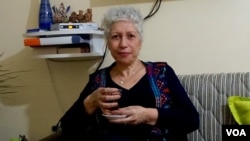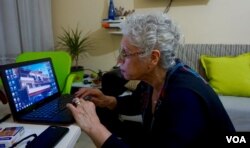The 60-year-old Syrian woman with gray hair and dark animated eyes sitting opposite cries. “I am surprised we have not used up all our tears,” she says.
Her tears are shed for her now-abandoned house in Damascus, for the remembrances of things past, illustrated by the many photographs of family and friends, musical gatherings and dinners she swipes through on her cell phone. She talks of the dispersal of her family - a grandson and two daughters in Germany, another daughter in Switzerland, an economist husband in Doha.
She recalls the farewell party she helped throw in December for Syrian journalist and filmmaker Naji Jerf the night before he was due to fly with his family to Paris, where they were going to apply for asylum. He never made the flight - Islamic State militants shot him dead the next morning, punishment for documenting the atrocities of the terror group in northern Syria.
And then, as she prepares a simple evening meal in her small, sparsely furnished apartment in the southern Turkish town of Gaziantep, Raja Banout sings, doing what she is teaching other Syrian refugee women to do; to overcome pain and disorientation with song, to strengthen the soul with music.
Banout is the moving spirit of an all-female choir called Haneen (nostalgia) that includes women from all over Syria – Damascus, Aleppo, Homs, Raqqa and Deir ez-Zor – who are now refugees in Gaziantep and who sing traditional folk songs in the many different languages of their shattered home country – Arabic, Kurdish, Turkmen, Syriac, Armenian, Circassian and Assyrian.
They celebrate the diversity of Syria, hoping music will overcome the topography of division.
“We decided to face war, pain and the suffering of Diaspora with intellectual and cultural empowerment,” says Banout. “I told women we should sing. And they said, ‘You are crazy, we are at war.’ And I said that is exactly why we should sing,” recalls Banout.
In some ways Banout is recreating the life she had in Damascus before the five-year-long civil war broke out. She founded a cultural association in the Syrian capital, promoted the arts and organized concerts as well as a choir for seniors. The family left soon into the conflict. “We demonstrated against Assad and I was worried for the girls. Some of their friends were detained and I won’t tell you how they were abused,” she says.
Banout and her husband left behind a thriving business, heading first to the Emirates and then Qatar. “We lost everything, millions of dollars. But we are the lucky ones; we are educated and could adapt and still have a good life.” But she felt she had to do more and within months moved alone to Gaziantep, telling her husband her real work was there among Syrian women.
“For women there are problems with all of life’s details. From finding accommodation to finding work. Then there are huge obstacles because of documentation. As refugees here women can’t marry legally and they can’t register babies. Most children aren’t being educated. Everything is a struggle,” she says.
'They have given up'
Most refugee families are headed by women. Their husbands are dead, fighting in Syria, or heading to Europe to clear a way for spouses and children to follow. And those who have husbands still with them often find their men are of little use. The poorly educated ones seem unable to adapt. “I see their eyes,” Banout says of the men. “They are defeated - useless because they no longer can protect their families. They have given up.”
But the biggest problem for women is an emotional one, she says. “They miss their homes; they too like the men feel they have lost everything. They need to go back to Syria - even those in Europe want to go back.”
Hence naming the choir Haneen, which also has the meaning of yearning.
Banout is urging the women to use the pain of loss as a strength, a goad. “Most of the time when we are singing, we are crying, but it is cathartic.” The tears are for weekly informal get-togethers in Banout’s apartment and not for when they are performing publicly. Then they take on the role almost of a chorus in classical Greek drama for the wider refugee community, describing and commenting upon the life and history of Syrians by singing the traditional heritage of a country smashed to smithereens, possibly beyond repair.
On a cold night in Gaziantep, the women gather in Banout’s apartment - 15 of them on this occasion. They range in age from a 15-year-old girl from a Damascus suburb to women in their sixties. They are loud and boisterous and the small room is full of laughter. They eat and share the latest news, and as they do so someone strikes up a song with others joining in. Every now and then women will start dancing. The singing and dancing will be interrupted by more laughter, story-telling and the latest gossip.
United by music
They are forging themselves into a sisterhood, despite the fact they come from very different walks of life. They are united not just by music and nationality. Many in the room have been detainees; some before the war or during by Assad’s intelligence services, others by the jihadists.
Some have suffered beatings and abuse.
“The first time the choir came together, we sang for an hour. It was sad but beautiful. And afterwards I felt energized,” says Hala Al Naser, a dark-haired woman in her forties. Another woman, Lewaa Ashqar, who spent a year detained in Assad’s prisons, explained the importance of the group: “We didn’t know what is coming and we couldn’t plan for the future, we just sat and waited for years and this allows us to grab some control.”
The choir is just part of the process of empowerment Banout is trying to foster. Along with the singing, private and public, she and her Haneen colleagues also organize workshops on politics and women's rights.
She has an immediate target. Working with some of the poorest refugee families in Gaziantep, Banout is trying to to dissuade hard-pressed families from agreeing to marry off teenage daughters to much older Turkish or Gulf Arab men. “Today I met two girls - both 15 - who have married twice already. One has a baby daughter. Their husbands stayed with them for a few weeks and then just left them. As they were not married legally in Turkey, they have no rights, no recourse,” she says.
But a lot of the workshops focus on a future Syria. Time can’t be regained, but she retains hope that out of the wreck of now, a better Syria can be shaped.
“My Marshall Plan is simple,” she says. “To fashion a group of 1,400 determined women - 100 for each of Syria’s provinces - so that when this war is over, they will change Syria.”












